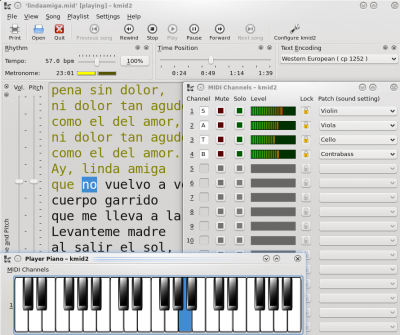KMid2
Appearance
Template:I18n/Language Navigation Bar
 |
Simple Karaoke or getting the best from your Midi Synthesizer! |
KMid 2 is in preparation. As part of Extragear it does not necessarily ship on the same date as KDE 4.4, but it is on track for a stable release around that time. Meanwhile, a preliminary release 0.1.0 has been published.
So what is the current status?
Currently implemented
Here are some major features implemented in KMid2:
- MIDI and Karaoke files are supported.
- Playback to external hardware MIDI devices.
- Allow to use software synths as well, like Timidity++ and QSynth/FluidSynth.
- Tempo and volume controls.
- Added a pitch (transpose) control.
- Rhythm view (visual metronome).
- Configurable character encoding, font and color for lyrics.
- Playlists (song collections).
- MIDI Mapper, translating General Midi events into other events understood by some synthesizers.
- Channel window, with solo/muting controls and instrument selectors.
- Piano player window, using VMPK artwork and technology.
- Runs in Linux, using the ALSA Sequencer.
What is not yet ready?
- Support for Windows and Mac OSX.
- Multiple MIDI output ports. Currently plays to a single output port.
- Konqueror integration.
Demo
See KMid2 in action in this Screencast
Notes for usage
- If you use Timidity++ as a software synthesizer, you may have to install GUS patches or sound fonts. You can find them at freepats
- In this case you will need to start Timidity++ with
$ timidity -iA
- There is an init script
$ /etc/init.d/timidity start
- (in Debian, the package timidity-daemon)
- Fluidsynth is an alternative. It has a helpful gui called QSynth. For soundfonts, try General User GS.
Download
- Source packages
- http://sourceforge.net/projects/kmid2/files/
- openSUSE Build Service - Search packages
- http://software.opensuse.org
- openSUSE Build Service - RPM packages for openSUSE
- openSUSE 11.2
- openSUSE 11.1
- openSUSE 11.0
- openSUSE Build Service - DEB packages for xUbuntu
- xUbuntu_9.04
- xUbuntu_9.10
- Gentoo ebuild
- http://packages.gentoo.org
Resources
- If you are interested in building for testing, please read the README
- The source code repository for testing and development is available from here
